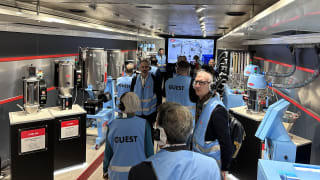Rise to global supplier of turnkey systems
The fusion and the bankruptcy of the Klöckner-Werke were big challenges for KHS at the beginning of the 1990s. The solution was to have the company grow through further investments and acquisitions to become a turnkey supplier to the beverage, food and non-food industries.Another factor which proved successful was the group's early global orientation. At the end of the 19th century KHS' predecessor companies were already looking for sales opportunities well beyond the German border. In 1893, for example, Lorenz Enzinger presented his innovations at the World Fair in Chicago. In addition to its five plants in Germany KHS today operates production facilities in the USA, Mexico, Brazil, India and China. The company is also represented by an extensive sales and service network on all of the relevant markets worldwide. "The name KHS is now synonymous throughout the globe with powerful filling and packaging systems for the beverage industry," explains Becker.
Shaping the future with sustainable products
For years the KHS Group has increasingly focused on sustainability in the development of new, future-proof plant engineering. "As one of the market leaders in filling and packaging we’re fully aware of our responsibility to the environment. The issue of sustainability thus plays an important role in the development of our innovative and cost-effective products," Becker states. Saving on resources is especially important in this context. Companies large and small the world over rely on energy- and resource-saving machinery to fill and package their bottles, cans and kegs. The KHS Group works towards producing lighter and lighter containers in its Bottles & Shapes program, to name just one example here. At drinktec 2017, for instance, the company introduced the lightest 0.5-liter PET bottle in the world to date, weighing just 5 grams. KHS also premiered a marketable concept for the forming and filling of plastic bottles which involves just one process step.Further landmarks pertinent to the topic of sustainability include the development of the Nature MultiPackTM, which bonds bottle and can packs together using dots of adhesive instead of shrink film, and the invention of Plasmax barrier technology, which applies a coating of glass to the inside of PET bottles. Another of the new avenues KHS is exploring together with its customers is the digitization of the production process from 3D line design to virtual commissioning. With these and a number of further innovations in the pipeline the company is looking to the future with much optimism.
Source: KHS Group


